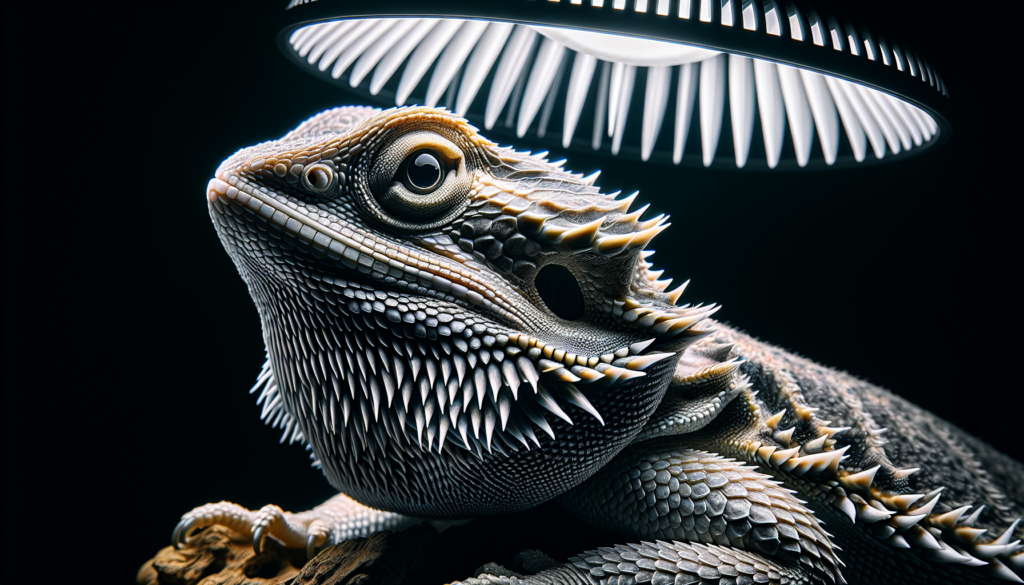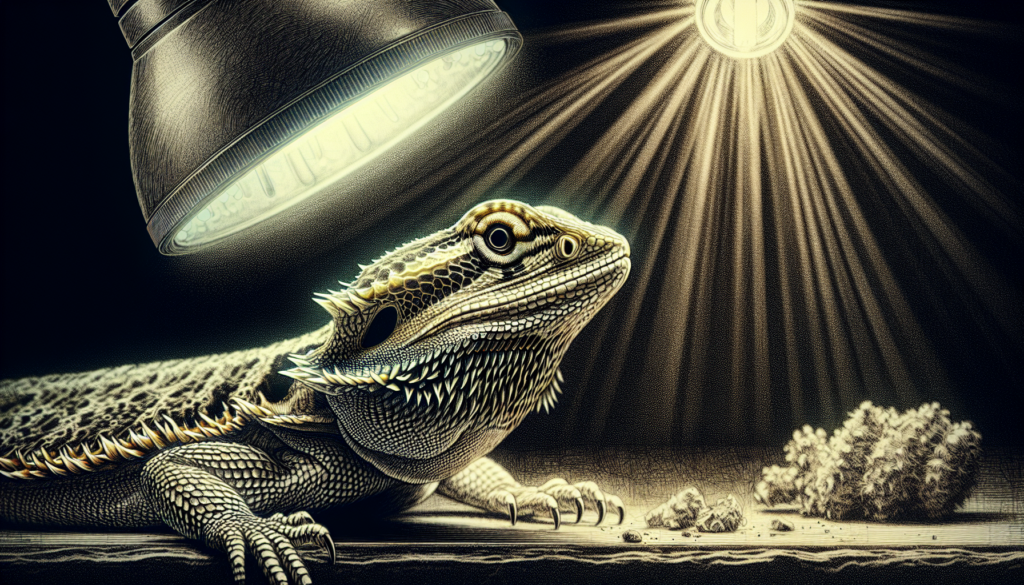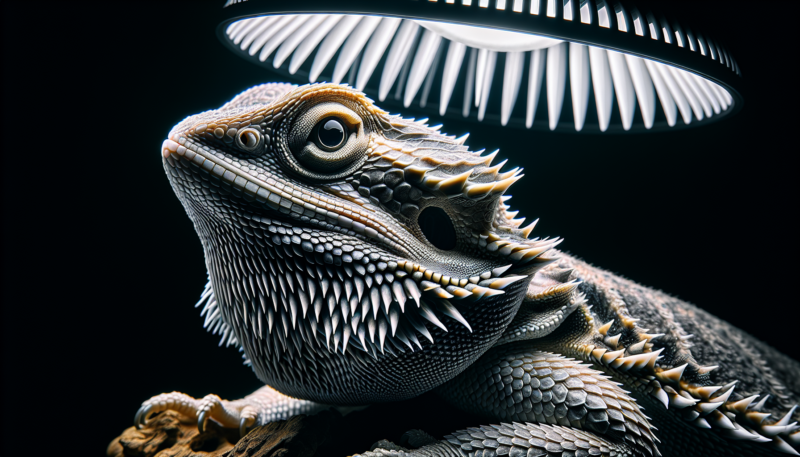Imagine you’re strolling through a pet store, browsing the reptile section when you spot a fascinating creature basking under a heat lamp. It’s a bearded dragon! Curiosity piqued, you start contemplating whether owning one is the right choice for you. Well, before you make your decision, there’s an essential factor you need to be aware of – the UVB percentage. In this article, we’ll explore why understanding this crucial element is vital to the health and well-being of these incredible reptiles. So, let’s shed some light on the topic and unlock the secrets behind the importance of UVB percentage for bearded dragons.
Understanding the Importance of UVB Percentage for Bearded Dragons
What is UVB?
UVB, or ultraviolet B, is a type of ultraviolet radiation that is crucial for the health and well-being of bearded dragons. It is a specific wavelength of light that is emitted by the sun and certain artificial lighting sources. UVB plays a vital role in the synthesis of Vitamin D3 and the absorption of calcium, both of which are essential for the proper functioning of a bearded dragon’s body.
Role of UVB in Bearded Dragons’ Health
UVB is essential for bearded dragons’ health in several ways. Firstly, it is necessary for the synthesis of Vitamin D3 in their skin. When a bearded dragon is exposed to UVB light, the precursor molecule 7-dehydrocholesterol in their skin is converted into pre-vitamin D3. This pre-vitamin D3 is then further metabolized in the liver and kidneys to form the active form of Vitamin D3, which enables the absorption of dietary calcium.
The link between UVB and calcium absorption is crucial because bearded dragons require high levels of calcium for proper bone growth and maintenance. Without sufficient UVB exposure, their bodies are unable to synthesize Vitamin D3, resulting in limited calcium absorption and potentially leading to several health issues, including metabolic bone disease.
Additionally, UVB exposure also plays a role in the immune system of bearded dragons. Studies have shown that UVB radiation enhances the immune response of reptiles, including bearded dragons. Proper UVB exposure can contribute to the overall health and disease resistance of these reptiles.
Furthermore, UVB exposure has been found to affect the behavioral aspects of bearded dragons. It helps regulate their circadian rhythm, which influences their sleep patterns, activity levels, and overall behavior. Adequate UVB exposure is necessary for maintaining a healthy and balanced behavioral pattern in bearded dragons.

Understanding the UVB Percentage
UVB percentage refers to the amount of UVB radiation emitted by a lighting source in relation to the total amount of light it produces. This percentage is a crucial factor to consider when selecting the appropriate lighting for bearded dragons. It determines the intensity and effectiveness of the UVB radiation provided to the reptile.
The Optimal UVB Range for Bearded Dragons
Determining the ideal UVB range for bearded dragons can be challenging, as it is influenced by various factors such as age, health, and environmental conditions. However, the generally recommended range for UVB is between 5% and 10%. This range ensures that bearded dragons receive adequate UVB exposure without the risk of overexposure or insufficient exposure.
Different UVB levels can have varying effects on the health of bearded dragons. Insufficient UVB exposure can lead to hypovitaminosis D, metabolic bone disease, weakened immune system, behavioral changes, and lowered reproductive success. On the other hand, excessive UVB exposure can cause overexposure symptoms, hypercalcemia, and eye damage.

The Consequences of Insufficient UVB
Insufficient UVB exposure can have severe consequences for the health and well-being of bearded dragons. One of the main issues that arise is hypovitaminosis D, which is a deficiency of Vitamin D3. Without sufficient Vitamin D3, bearded dragons are unable to absorb calcium from their diet, leading to metabolic bone disease. This condition can result in weak and deformed bones, fractures, and other skeletal abnormalities.
A weakened immune system is another consequence of insufficient UVB exposure. UVB radiation plays a vital role in enhancing the immune response of bearded dragons. Without proper UVB exposure, these reptiles are more prone to infections and diseases, making them more vulnerable to various health issues.
Insufficient UVB exposure can also cause behavioral changes in bearded dragons. They may become lethargic, lose their appetite, or exhibit abnormal movements. These changes in behavior can be distressing for both the bearded dragon and its owner.
Furthermore, lack of UVB exposure can impact the reproductive success of bearded dragons. Inadequate levels of UVB can lead to hormonal imbalances, resulting in decreased fertility and compromised reproductive health.
Determining the UVB Output of Lighting Sources
To ensure that bearded dragons receive sufficient UVB exposure, it is crucial to determine the UVB output of the lighting sources used in their habitats. One way to assess the UVB output is by reading the UV Index labels on the bulbs. These labels provide information about the intensity of UVB radiation emitted by the bulb. It is important to select bulbs with appropriate UV Index ratings to meet the UVB needs of bearded dragons.
Comparing different lighting brands can also help in determining the UVB output. It is advisable to choose reputable brands that prioritize the health and well-being of reptiles. Consulting reliable sources, such as veterinarians or reptile experts, can also provide valuable insights into the UVB output of specific lighting sources.
Factors Affecting UVB Penetration
Several factors can affect the penetration of UVB radiation into a bearded dragon’s enclosure. The distance between the UVB light and the reptile is a significant factor to consider. The closer the bearded dragon is to the UVB light source, the more intense the UVB exposure will be. However, it is essential to ensure that the distance is appropriate to avoid overexposing the reptile to harmful levels of UVB radiation.
The type and material of the enclosure can also impact UVB penetration. Glass and plastic materials can filter out a certain amount of UVB radiation, reducing its effectiveness. Using enclosures made of materials that allow for proper UVB penetration, such as mesh or screen, can help ensure adequate exposure.
The presence of obstructions within the enclosure, such as plants or decorations, can also obstruct the UVB radiation from reaching the bearded dragon. It is important to arrange the enclosure in a way that allows for unobstructed UVB exposure throughout the habitat.
Lastly, the age and health of the bearded dragon can influence the amount of UVB exposure needed. Younger bearded dragons generally require more UVB exposure for proper growth and development. Additionally, bearded dragons with certain health conditions may require specific UVB levels to support their overall well-being.
The Dangers of Excessive UVB
While UVB exposure is crucial for the health of bearded dragons, excessive exposure can also be harmful. Overexposure to UVB radiation can result in various symptoms, including increased thirst, skin burns, lethargy, and loss of appetite. These symptoms indicate that the bearded dragon is receiving excessive UVB radiation and should be adjusted accordingly.
Hypercalcemia is another risk associated with excessive UVB exposure. This condition occurs when bearded dragons have an excessive amount of calcium in their blood. Hypercalcemia can lead to organ damage, particularly affecting the kidneys and liver. It is important to monitor UVB exposure to prevent such health complications.
Moreover, excessive UVB exposure can cause eye damage in bearded dragons. The intense UVB radiation can lead to the development of cataracts or other eye-related issues. It is crucial to provide bearded dragons with the appropriate UVB levels to avoid any potential harm to their eyes.
Choosing the Right UVB Lighting
Selecting the right UVB lighting is essential for ensuring the health and well-being of bearded dragons. It is recommended to choose UVB bulbs specifically designed for reptiles, preferably those that emit a broad spectrum of UVB radiation. These bulbs should have the appropriate UV Index rating, within the recommended range of 5% to 10%.
Additionally, it is important to consider the size of the enclosure and the specific needs of the bearded dragon. Some bulbs are more suitable for larger enclosures, while others are designed for smaller habitats. Taking into account these factors will help provide the optimal UVB exposure for the reptile.
Measuring and Monitoring the UVB Percentage
To accurately measure and monitor the UVB percentage, UVB meters can be used. These meters provide precise readings of the UVB output, helping in ensuring that the bearded dragon receives the appropriate UVB exposure. Regularly checking the UVB percentage is important, as the output of UVB bulbs can decrease over time.
The frequency of UVB percentage check may vary depending on the specific lighting source used and the recommendations of the manufacturer. However, it is generally advised to monitor the UVB output at least every six months and replace the bulbs if necessary to maintain the optimal UVB exposure for bearded dragons.
In addition to measuring the UVB percentage, regular replacement and maintenance of lighting sources are essential. Over time, UVB bulbs lose their effectiveness, even if they still emit visible light. Replacing the bulbs according to the manufacturer’s recommendations ensures that the bearded dragon receives the necessary UVB radiation for its health and well-being.
Conclusion
Understanding the importance of UVB percentage for bearded dragons is crucial for their overall health and well-being. UVB plays a vital role in their Vitamin D3 synthesis, calcium absorption, immune system function, and behavioral aspects. Insufficient UVB exposure can lead to various health issues, such as hypovitaminosis D and metabolic bone disease. On the other hand, excessive UVB exposure can also be harmful, causing overexposure symptoms, hypercalcemia, and eye damage. It is essential to choose the right UVB lighting, monitor the UVB percentage, and provide the appropriate UVB exposure to ensure the optimal health of bearded dragons.
